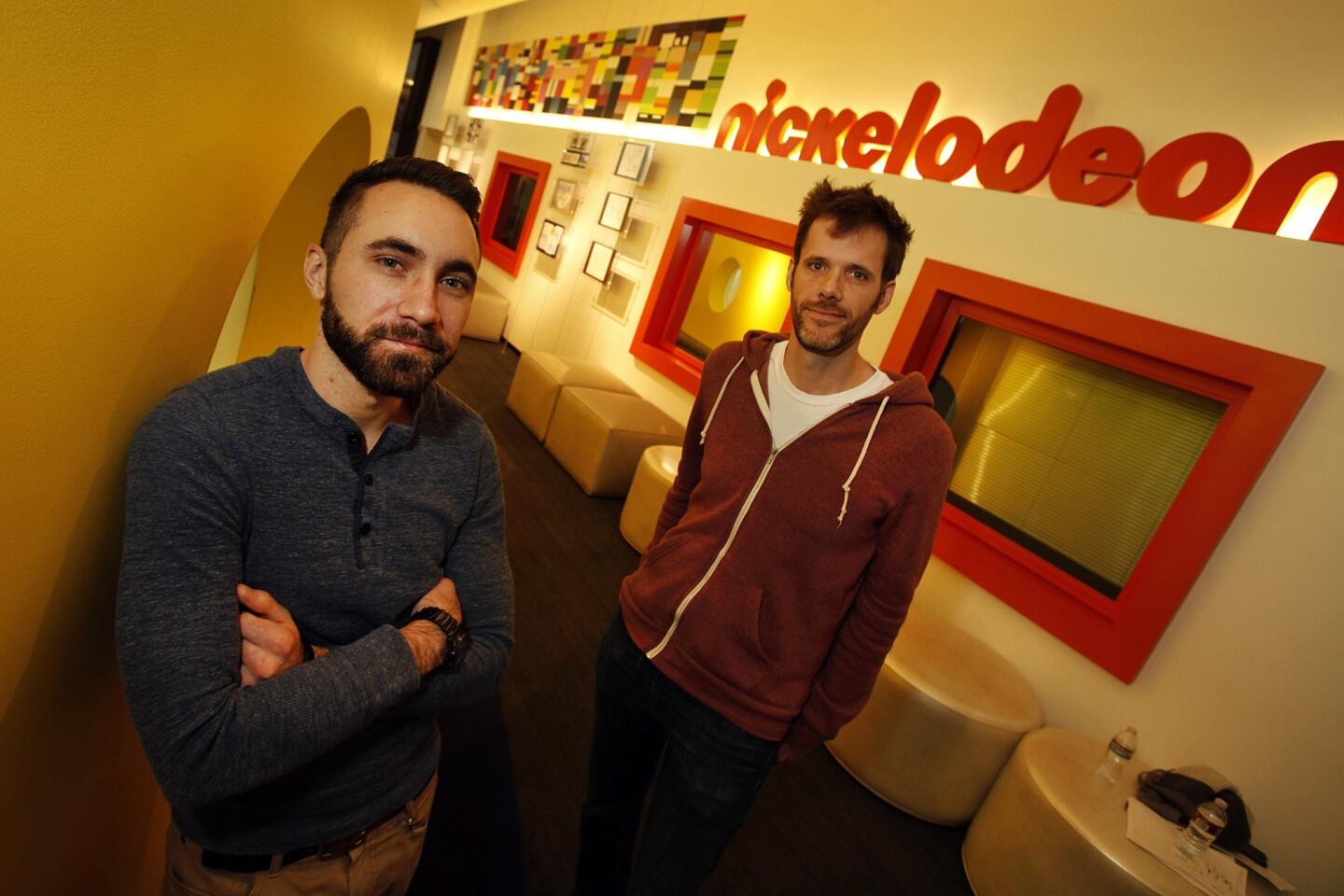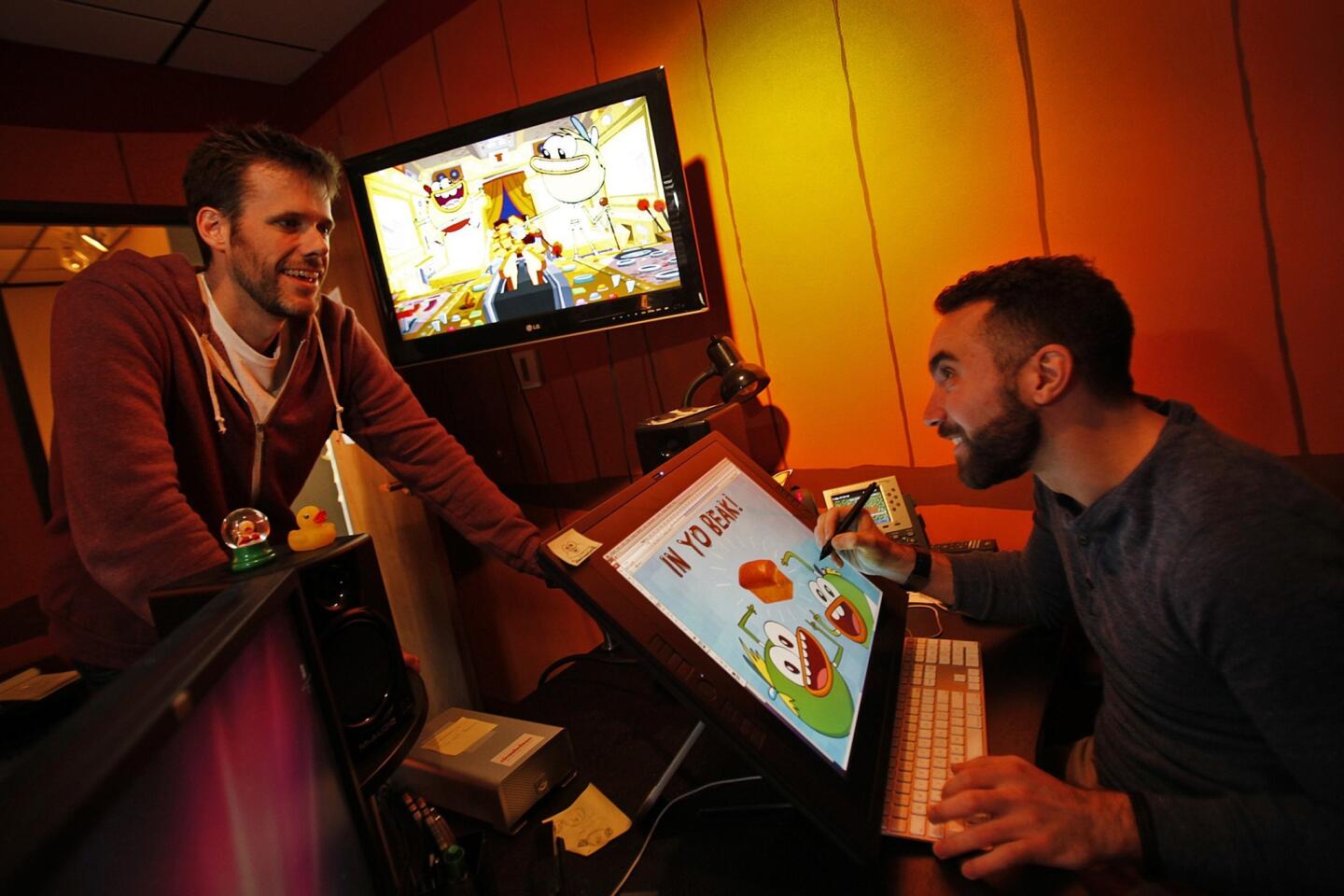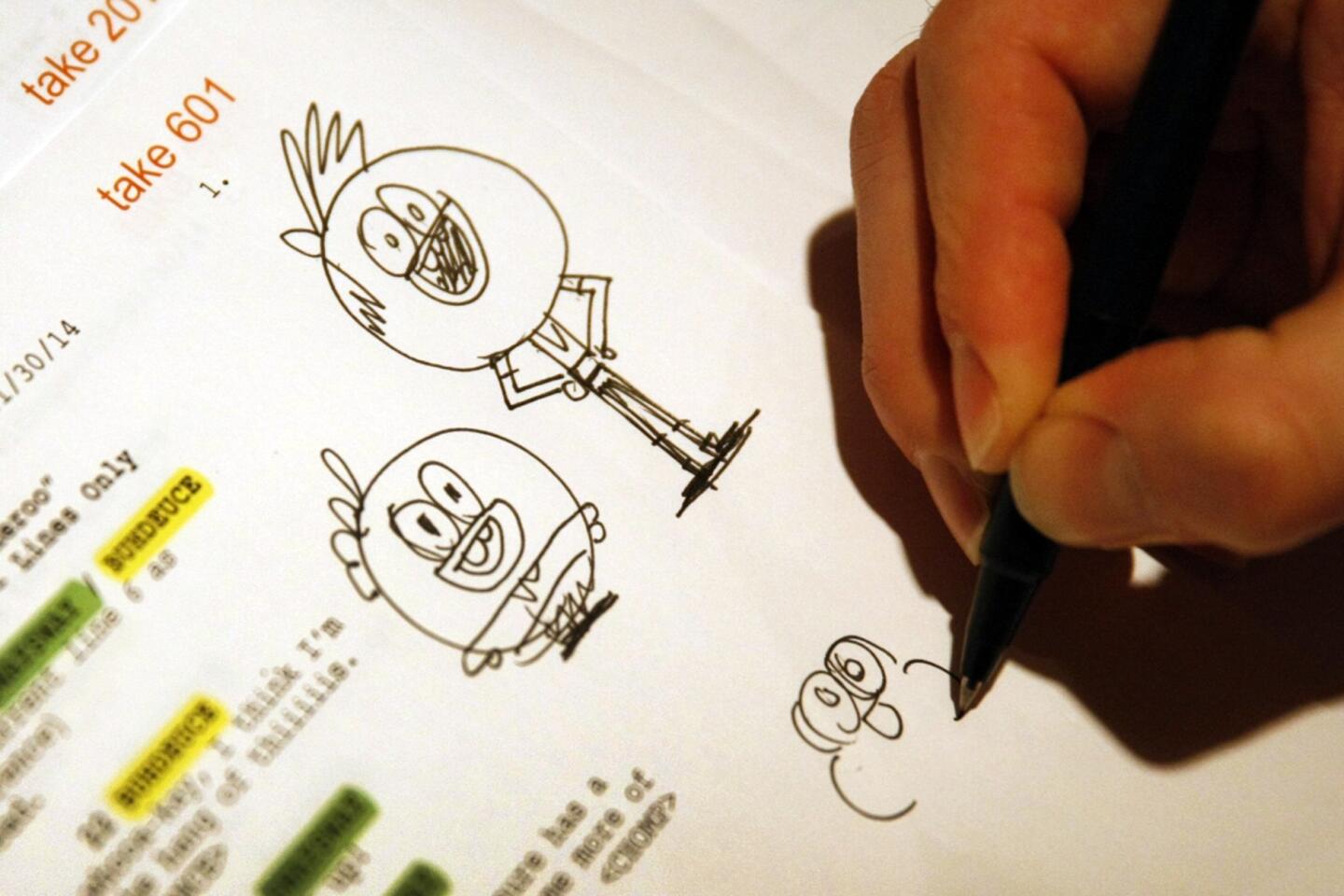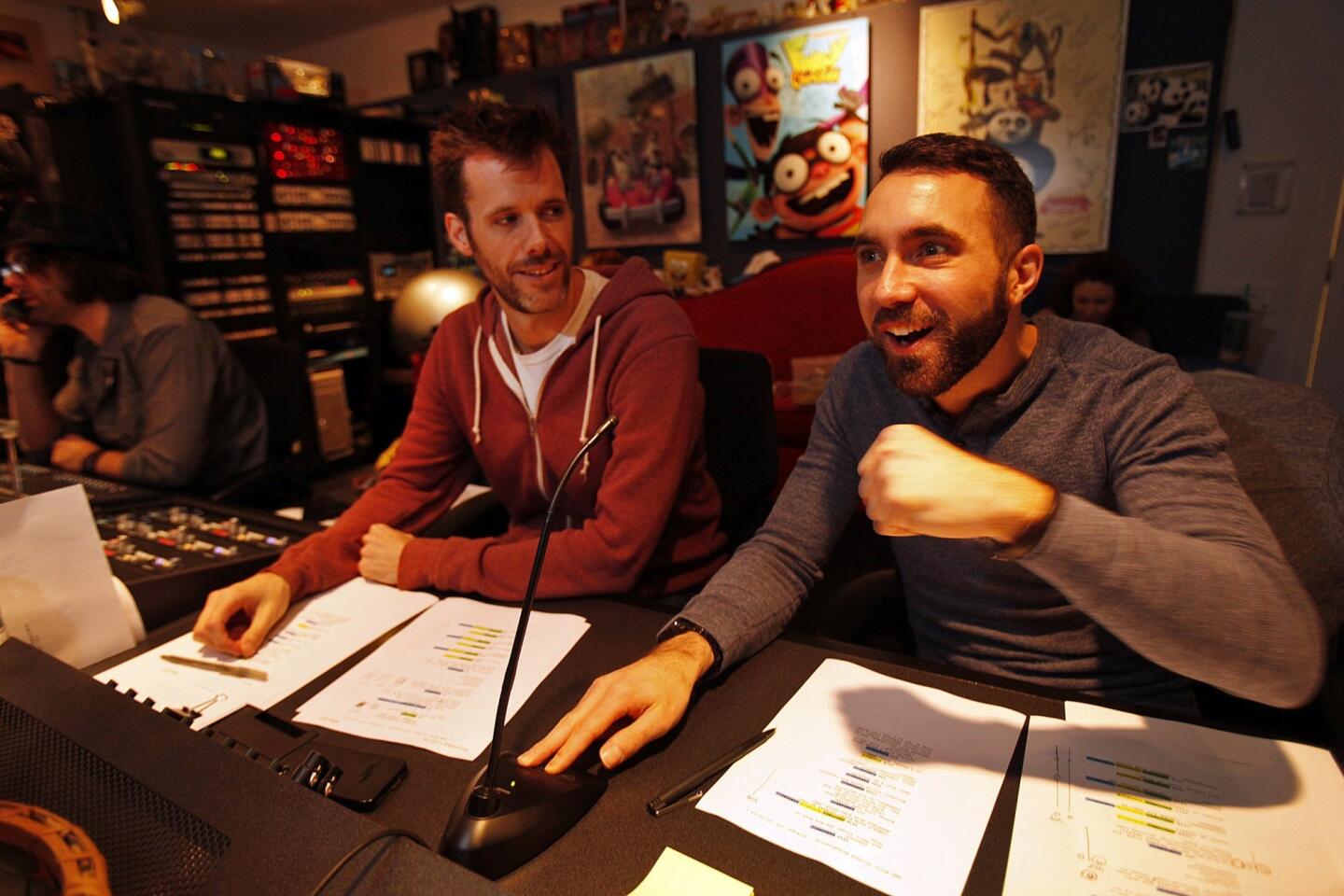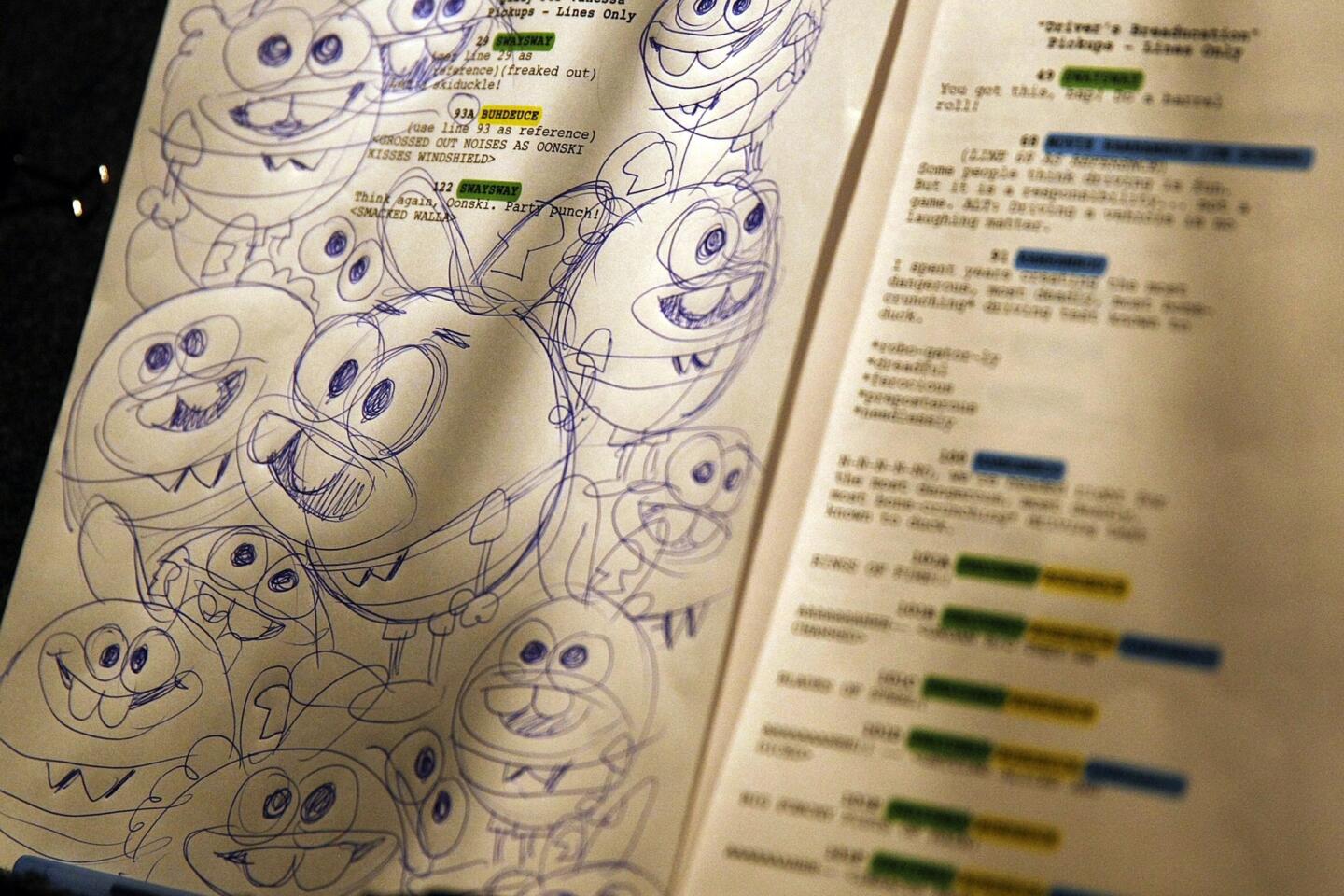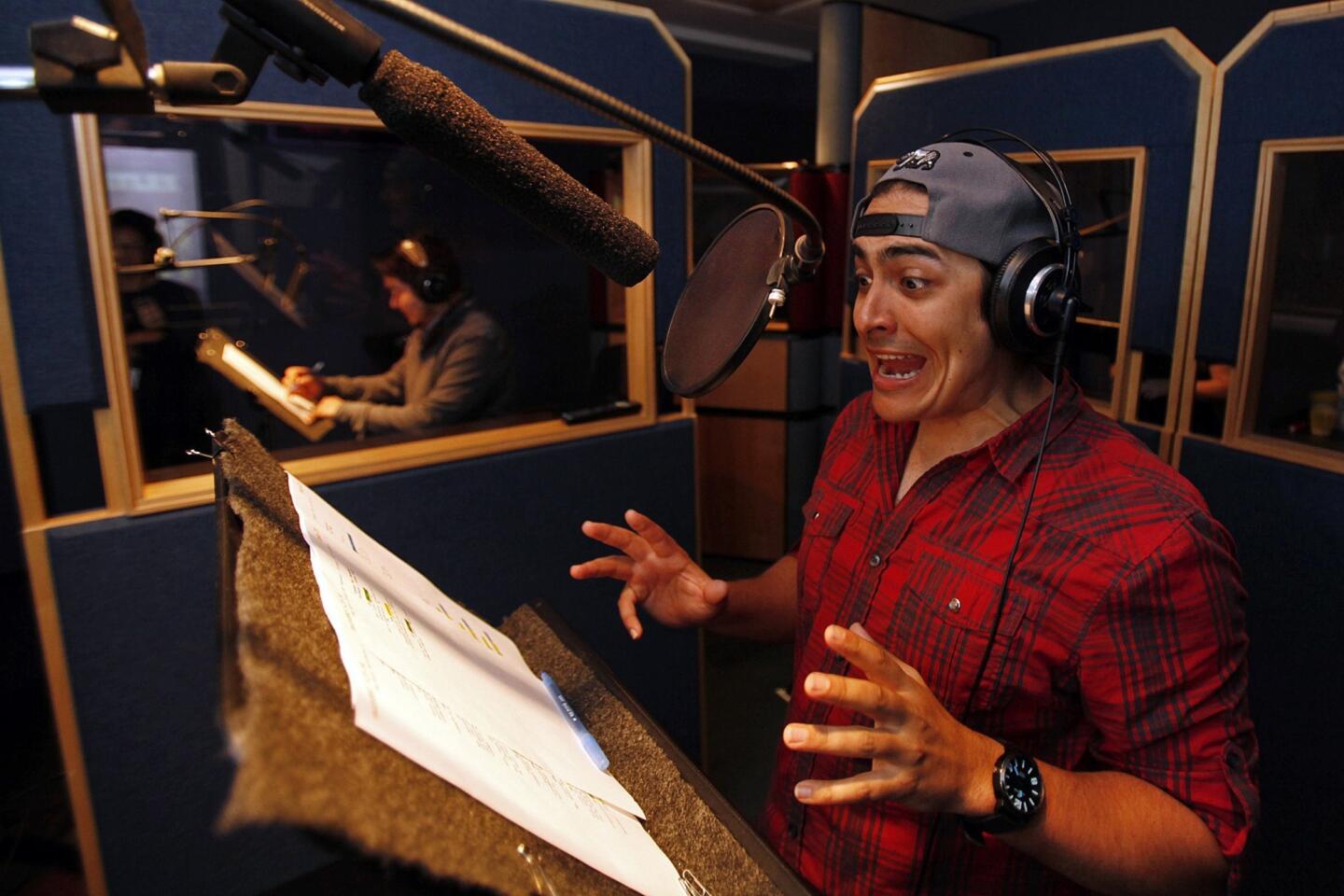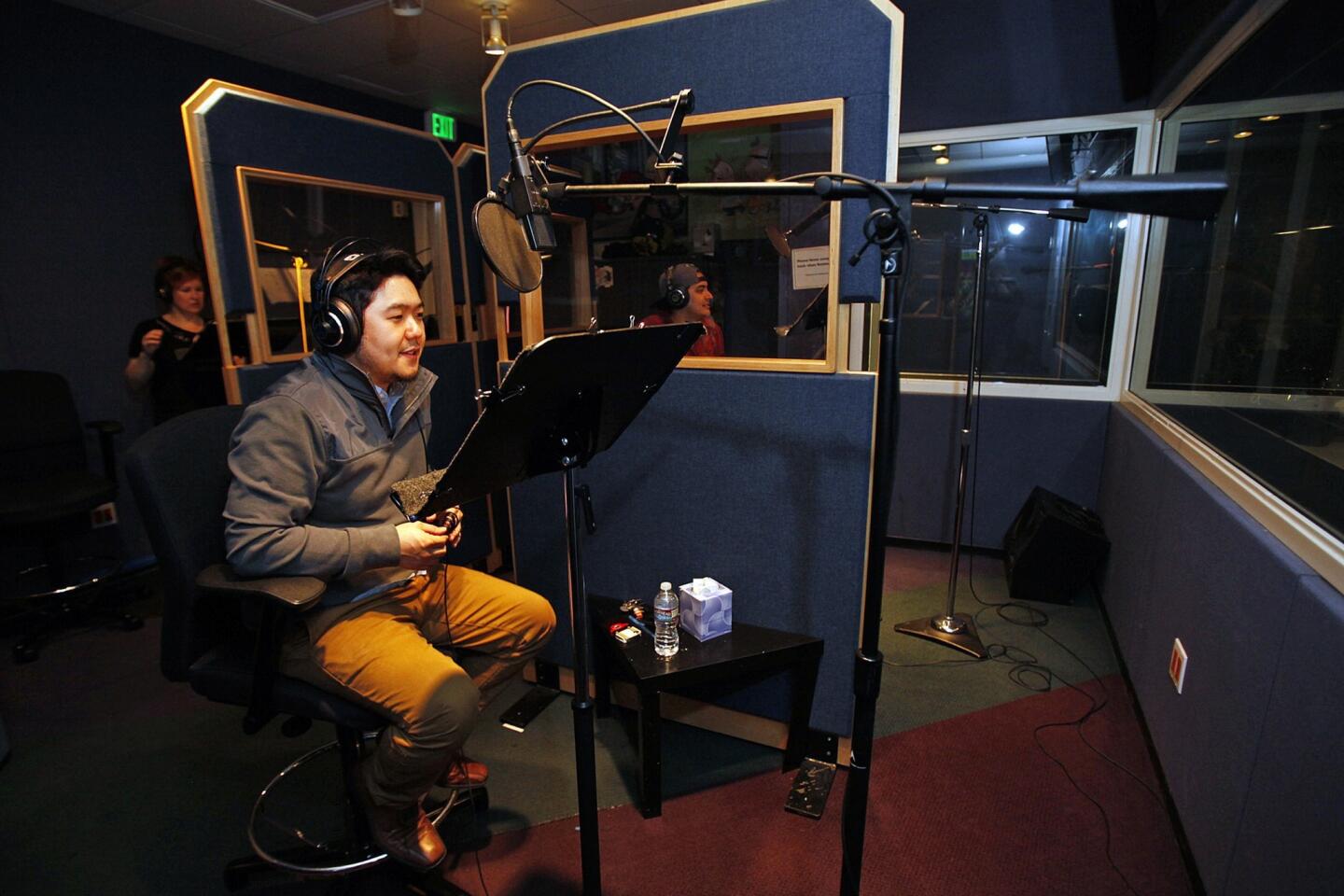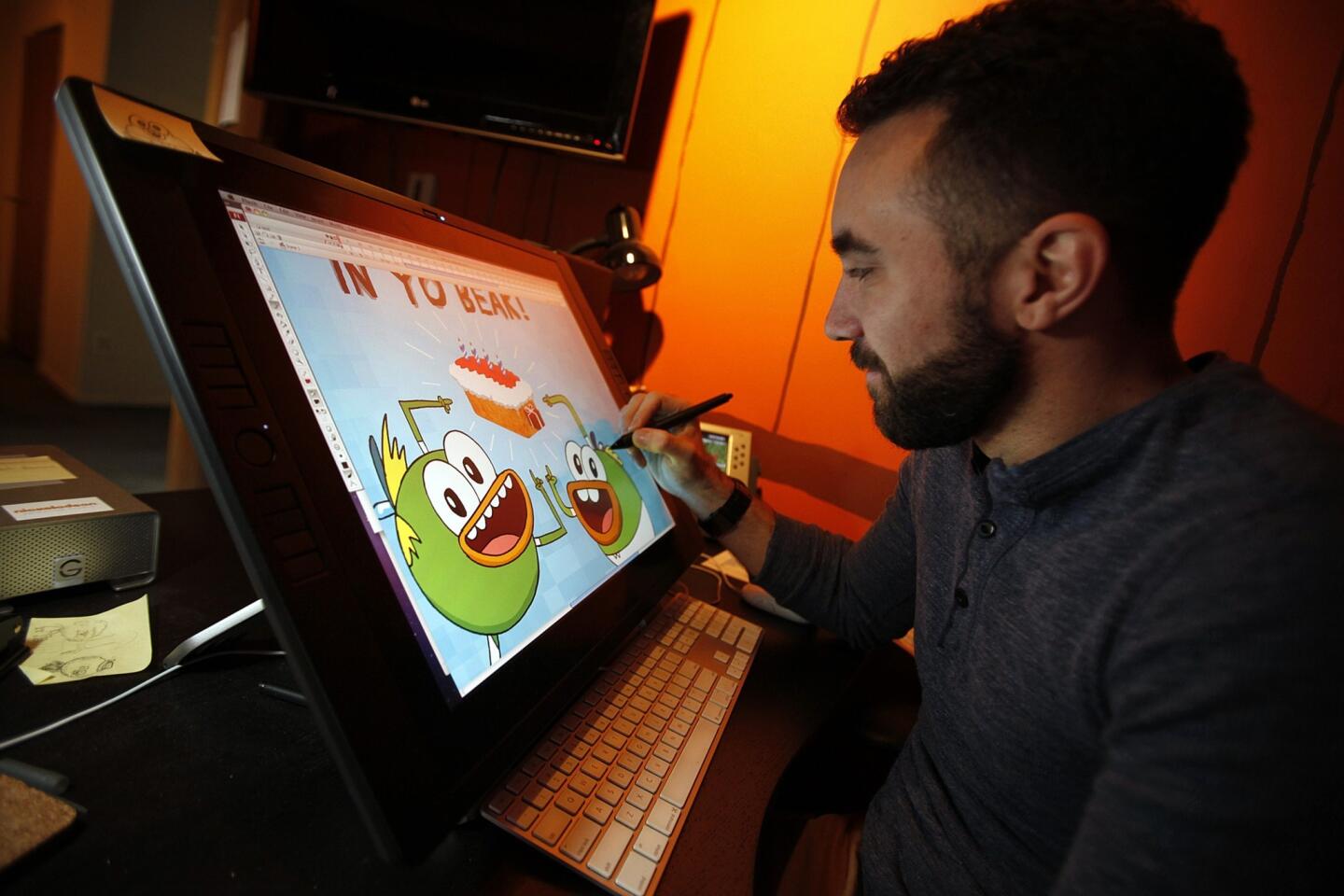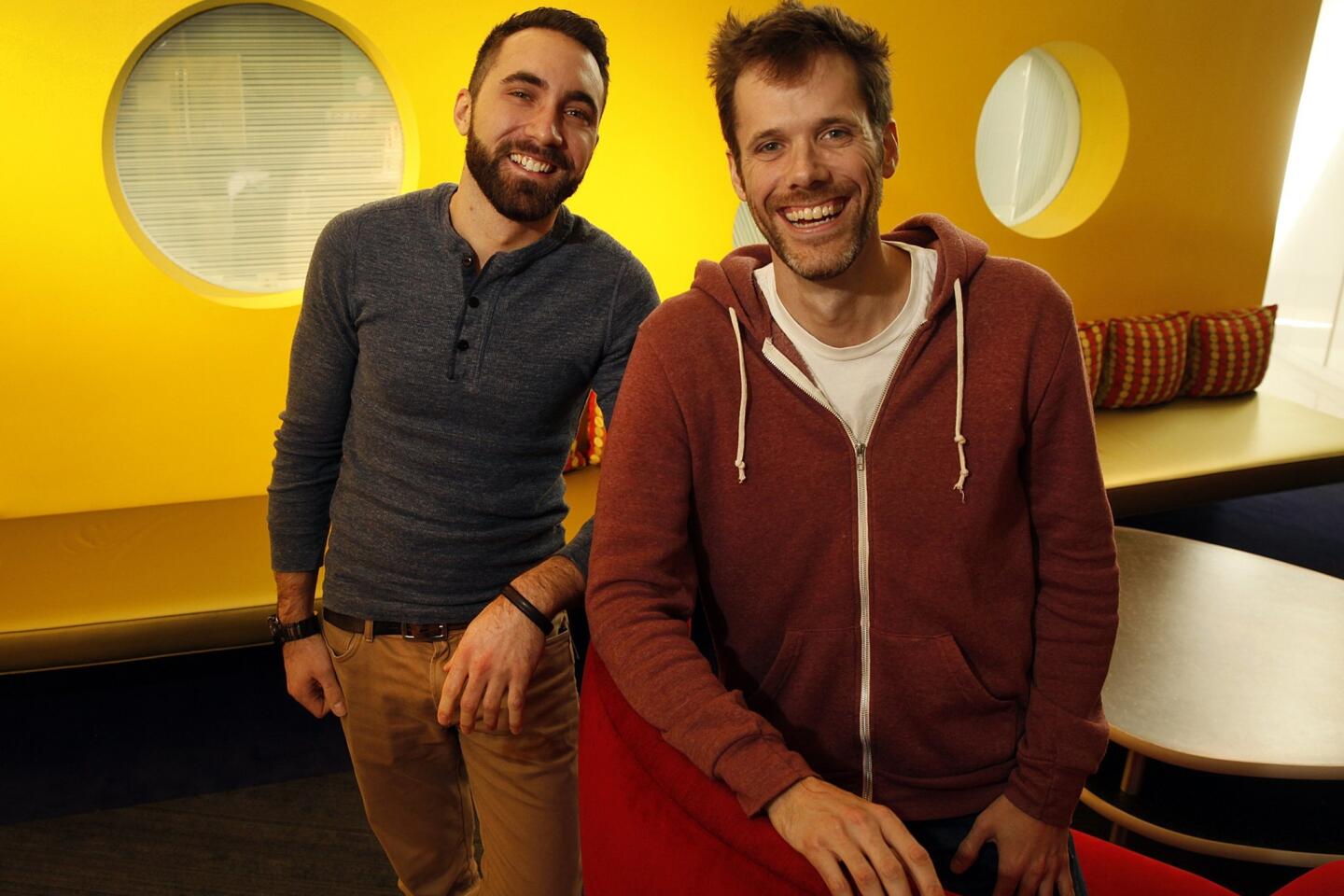Has Nickelodeon found its new bread winner?
Nickelodeon’s new cartoon was hatched not through traditional television channels but in a Studio City efficiency apartment nicknamed the “Doodle Chamber.” The 41/2 -minute cartoon about two feisty, accident-prone ducks was intended to be a one-off, a little film crafted to entertain fellow animators at a short-film festival held at a New York bar.
But in the hurly-burly world of children’s television, network executives are desperate to find that next big hit. When animator Gary Di Raffaele, who goes by the name Gary Doodles, got an inquiry from a Nickelodeon executive about his duck cartoon, which he had posted on YouTube: “I thought it was spam,” Di Raffaele said. “I couldn’t believe someone from Nickelodeon would contact me.”
Within a couple of months, Nickelodeon hired Di Raffaele and co-creator Steve Borst to expand “Breadwinners” into a full-fledged television series, which premieres Feb. 17 and then moves to hallowed cartoon ground: Saturday mornings. Nickelodeon hopes that SwaySway and Buhdeuce, two oddball ducks who deliver loaves of bread in a rocket-powered van, will bring home the bacon to help the network further recover from a frightening ratings collapse.
PHOTOS: Creating Nickelodeon’s animated comedy ‘Breadwinners’
In 2012, Nickelodeon’s ratings plunged 30%, allowing archenemy Disney Channel to grab the ratings crown. It was a tectonic shift in the pecking order of children’s TV: Nickelodeon for 17 years had been the No. 1 network among kids ages 2 to 11 by fielding a mix of animated and live-action shows that would appeal to different groups: boys, girls, preschoolers and the grade-school crowd.
Disney Channel has been the go-to channel among older children, particularly tween girls, with its wholesome scripted shows such as “Jessie.” Time Warner’s Cartoon Network — with its irreverent animation, such as “Adventure Time,” starring an old dog named Jake with magical powers — has been a boy magnet and a perennial third.
Nickelodeon needed to claw back. It ramped up program spending to discover new hits and boost the number of original episodes coming through the pipeline. It launched several winners, including a remake of “Teenage Mutant Ninja Turtles,” which spawned a lucrative toy line. Last year, the network scored with a sitcom about two girl buddies, “Sam & Cat”; the cartoon “Sanjay and Craig” about a 12-year-old boy and his talking snake; and a show for preschoolers about a pack of CG-animated pups called “Paw Patrol.”
PHOTOS: Nickelodeon stars: Where are they now?
The network has been under enormous pressure to find a successor to the sponge. In its 15th year, “SpongeBob SquarePants” still is a ratings and moneymaking machine (in recent years, the show has generated more than $220 million a year in advertising alone, according to Kantar Media), but fresh episodes have become less frequent as the “SpongeBob” executive producers, Stephen Hillenburg and Paul Tibbitt, focus their efforts on a second “SpongeBob” feature film, scheduled for release next year.
Moreover, it’s tougher these days for TV networks to grab the attention of children, who increasingly are glued to electronic tablets and their parents’ cellphones for amusement. Nickelodeon research found that children spend a quarter of their daily media consumption on computers and video game consoles. A study by consulting firm NPD Group estimated that more than three-quarters of all homes with children have at least one smart device.
FACES TO WATCH 2014: Digital media
“Now, 2- and 3-year-olds are tap-tap-tapping on a tablet or their mom’s smartphone,” said Wynne Tyree, president of Smarty Pants, a firm in Jonesborough, Tenn., that specializes in youth trends. “Consumer behavior is changing, and the younger the children, the more that behavior is changing.”
To hold on to kids, who can switch their viewing choices with a swipe of a finger, some TV producers have accelerated the pace of episodes to pack in more action. They have borrowed elements from video game culture, added an assortment of butt jokes and pop-culture references geared toward the parents who might be watching too. Characters are more rambunctious.
“The humor is getting more sophisticated,” Russell Hicks, president of content development and production, Nickelodeon Group, said. “What’s most remarkable about this current generation is the amount of media they have consumed by the time they are 6 and 7 years old. They have more channels dedicated to them, access to tons of online content and everything that we have created for them. Because they’ve seen so much, and they want stories that are told in a fresh and new way.”
A new duck dynasty?
In a darkened recording studio at the Nickelodeon Animation Studio in Burbank last month, the two “Breadwinners” creator/executive producers sat before an electronic console as the actors, a few feet away in a glass-walled recording booth, experimented to find the appropriate level of duckness. They changed their voice inflection to sound more exaggerated and absurd.
“Do you want me to do more of the munches?” actor Robbie Daymond, who plays SwaySway, asked Di Raffaele and Borst.
“No, we’ve got plenty of munches,” Borst replied.
“Breadwinners” is a buddy comedy about two mismatched ducks — the ringleader SwaySway and his stubby buddy and copilot, Buhdeuce, played by voice actor Eric Bauza.
The show unfolds a bit faster than most because the episodes are constructed around an underlying musical track, recorded before the animation process begins. The boom-boom metronomic beat seems to drive the action on screen. Children who watched the show in Nickelodeon test audiences bounced up and down to the beat.
“It was like nothing we had ever seen before,” said Jenna Boyd, senior vice president of animation development at Nickelodeon Animation. “We loved the way they kept the audience on their toes.”
Nickelodeon ordered 20 episodes. Each episode contains two 11-minute story arcs.
To appeal to today’s crop of boys ages 6 to 11, the ducks are fluent in mixed martial arts, throwing “booty kicks” with their bottom ends and “party punches” with their four-finger hands. And the ducks have little-kid problems: Buhdeuce throws a tantrum on his way to a haircut and he has trouble tying his shoes. SwaySway is there to help.
These are not cynical cartoon characters that might be found on Fox or Cartoon Network. Instead, the ducks are good citizens who get scared when they encounter furry, three-eyed monsters. To deliver their bread, the pair braves an encounter with leather-jacketed “Biker Ducks” that live in a sketchy part of town — the “Lower Yeast Side.”
The inspiration, said Di Raffaele, was growing up in an Italian American family in the suburbs of New York, where bread was a staple of meals. “And we think gluten has been getting a bad rap lately,” Di Raffaele said.
PHOTOS: Celebrities by The Times
The pair met in Burbank more than two years ago, when both worked on the “Mad” TV show for Cartoon Network. Di Raffaele was an animator, and Borst was a writer. Di Raffaele shyly approached Borst one day in the coffee room and asked whether he did any writing outside of work.
“He looked approachable,” the earnest Di Raffaele said. Di Raffaele had been doodling characters for years but felt he needed help in the storytelling department.
Borst, who had worked in Nickelodeon’s promo department in New York before moving to Los Angeles to pursue his dream of becoming a TV writer, had found writing work, but it was tough breaking into TV in a big way. By early 2012, he had quit his job to move to San Francisco, where his girlfriend lived. He was writing a zombie novel and was “waiting for the phone to ring.”
It was Di Raffaele who called, telling him to “forget the book” and instead collaborate on a cartoon to enter into the Midsummer Night Toons festival that summer in New York.
Because Borst, a 36-year-old New Jersey native, liked Di Raffaele’s style of animation and the birds’ big-brother, little-brother relationship, he agreed.
VIRTUAL TOUR: Hollywood’s Walk of Fame
“At its core, the show is about two best friends,” Borst said. His pal, Di Raffaele, 31, added: “They are in it together.”
To voice the characters, Di Raffaele found Daymond on an open casting website. To audition for the parts, both actors went to Di Raffaele’s small Studio City apartment, the Doodle Chamber. Di Raffaele then worked around the clock to draw the characters.
“I almost killed myself,” he said. “Some nights I didn’t sleep at all.”
Borst and Di Raffaele (neither is married, and neither has kids) said they wanted to differentiate the show with a musical score (Di Raffaele drafted a friend, Tommy Sica, who used to play with him in a band, to develop the beat). And they wanted the show to be funny — and upbeat.
“The world is filled with a lot of craziness, and we wanted to breathe a more optimistic light into it,” Di Raffaele said.
For two producers who toiled for years in near obscurity, the ducks’ rallying cry might as well be theirs: “No matter the challenge, no matter what, we always deliver and we never give up.”
After the rebound
Nickelodeon’s 2011-12 ratings slump rattled the entire company. Nickelodeon channels, including Nicktoons, make up the largest and most profitable business for the parent company, Viacom.
Nickelodeon channels should deliver nearly $1.7 billion in cash flow (a measure of profitability) this year, according to SNL Kagan, up about $200 million from the slumping years. That does not include another nearly $2 billion annually in sales of toys and merchandise based on Nickelodeon shows, including “SpongeBob,” “Dora the Explorer,” and “Teenage Mutant Ninja Turtles.”
Nickelodeon’s challenges are greater than simply producing a handful of hits. “This is the first generation of kids who are growing up without being tied to a traditional television set as their primary source of entertainment,” said Melanie Shreffler, a trend analyst with Smarty Pants. “For children, tablets are new and slick and personal. It’s a screen just for them.”
Shreffler said research found that parents feel better about handing their children a tablet rather than parking them in front of a TV set, even if their kids are watching “SpongeBob” and other shows that originated on TV. “Parents feel that it is a safer and better environment for their kids, a place where they won’t be barraged with advertising for a bunch of products,” Shreffler said.
PHOTOS: Box office top 10 of 2013 | Biggest flops of 2013
The entire industry, not just Nickelodeon, has been facing a quandary of how to sell shows to streaming services without destroying TV ratings. Wall Street analysts hounded Viacom, questioning its decision to sell so much content to streaming services such as Netflix and Amazon.com.
“Nickelodeon is in a tough spot. In a world where audiences are fragmenting and people are watching programs on new devices, that is bad for the networks that depend on ratings,” said Todd Juenger, a media analyst with Bernstein & Co. “But the shift is making the content these companies own even more valuable.”
For Nickelodeon, discovering new talent took on greater urgency. The network expanded its outreach to art schools, colleges and independent animators and began combing the Internet, which is how they found Di Raffaele and “Breadwinners.” Last year, Nickelodeon spent an estimated $468 million on programming costs — a 20% increase over 2011, said SNL Kagan.
Nickelodeon’s ratings wereupin 2013. January marked the 12th consecutive month of audience gains. In October, Nickelodeon surpassed Disney Channel to regain the title of No. 1 network among children ages 2-11. (Disney Channel maintains an edge in children 6-11.)
But the network knows it must keep up with changing tastes. Let’s face it, “SpongeBob” can be a bit of a square in today’s animation landscape, which has been influenced by the raunchy alcoholic dog Brian in Fox’s animated “Family Guy,” and the unruly grandsons in “Boondocks” on Cartoon Network.
“We needed to find new voices, people like Gary and Steve, who have grown up closer to this post-millennial world; people who share the positive outlook of this younger generation,” Nickelodeon’s Hicks said. “By being more open, we have allowed more people into our studio process.”
In October, Nickelodeon reclaimed its title as the top network among children ages 2 to 11 after a dramatic ratings slide in 2012. For most of the year, it trailed the Disney Channel.
Average daily audience of children between ages 2 to 11.
| Network | 2009 | 2010 | 2011 | 2012 | 2013 |
| Nickelodeon | 1,216,000 | 1,244,000 | 1,172,000 | 906,000 | 935,000 |
| Nick-at-Nite* | 330,000 | 416,000 | 306,000 | 170,000 | 232,000 |
| Disney Channel | 901,000 | 925,000 | 996,000 | 951,000 | 937,000 |
| Cartoon Network | 551,000 | 573,000 | 548,000 | 556,000 | 465,000 |
* prime-time programming block
Source: Nielsen, Disney Channel, Nickelodeon
More to Read
The complete guide to home viewing
Get Screen Gab for everything about the TV shows and streaming movies everyone’s talking about.
You may occasionally receive promotional content from the Los Angeles Times.
